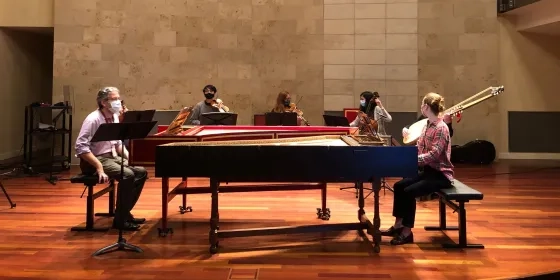Breaking new ground since 1643
SFCM’s historical performance program presents Monteverdi’s Poppea online on Sunday, May 2, and Tuesday, May 4.
The idea that creating something to represent a moment in time could still—or again—be relevant in another age is a testament to the timelessness of art. In that spirit, more than 370 years since the premiere of Claudio Monteverdi’s L’incoronazione di Poppea, the San Francisco Conservatory of Music’s Historical Performance department created two productions of the piece that reflect its relevance today. Both productions, which feature distinct casts, will be available for streaming online.
Poppea received its premiere in 1643 in Venice. Monteverdi broke new ground in the 17th century with this musical drama, which was one of the first works based on historical figures, including the Roman emperor Nero. What’s more, the plot flipped traditional moral expectations of the time: virtue is punished and greed rewarded. Power, love, ambition, revenge: these are universal human emotions and moral questions that have no doubt helped the work survive through centuries because audiences in all eras could relate.
By exploring events and people through the lens of when the music was written, Historical Performance students are empowered to understand the models of the past so that they can preserve performance traditions while adapting that knowledge into modern-day practice. As part of their studies, SFCM undergraduates and graduates have access to a robust collection of period instruments for their use—including strings, winds, and keyboards—from the Baroque to the Classical eras, deepening their context for how to perform works today from across a range of musical approaches.
Yet, in addition to refining their skills related to historical styles, the students involved in producing Poppea were called on to apply a Monteverdi-like ingenuity to their own work by relying on cutting edge modern technology to bring the centuries’ old piece to new life. The opera’s capture and recording was done using the Dante Audio Networking System—which offers players virtually no audio latency—and Ringcentral systems over a one-week period from April 12-18, 2021.
“The preparation and recording of this production of Poppea was very special,” said Corey Jamason, chair of the historical performance department and a director of the production. “The students really came together as a group and were incredibly positive and supportive of each other, making this magnificent piece come alive.”
Jamason said that rehearsal and recording in different rooms after months of preparation did not detract from the incredibly expressive performances and joy in making music together that is evident in the final products.
Both versions of Poppea will be streamed in upcoming days—on May 2 and May 4. Jamason, along with Co-Director of the Baroque Ensemble Elisabeth Reed and Diction Coach of Opera and Musical Theatre Marcie Stapp, directed the piece. More than 40 students are included in the casts, including musicians playing the harpsichord and theorbo.
“I’ve been inspired all year by their resilience, their incredible work ethic and their powerful performances of this very special piece,” said Jamason.
Like the best examples from art and culture, those characteristics will stand the test of time.
SFCM offers a comprehensive track of study geared toward music of the past and, unlike many programs, traverses all eras of music history; details can be found at the Historical Performance webpage.
